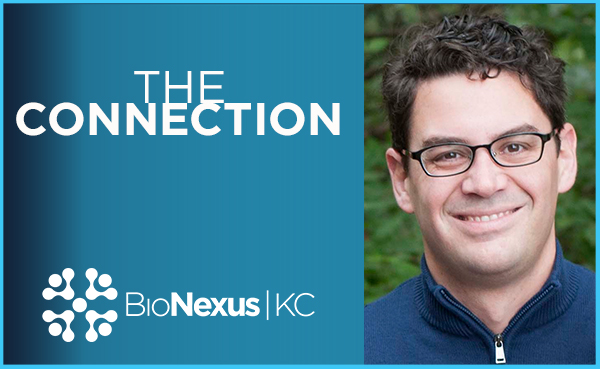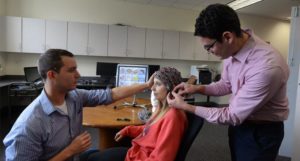
Giving voice to the voiceless seems more philosophical than scientific, but for Dr. Jonathan Brumberg, Associate Professor in the Department of Speech-Language-Hearing at the University of Kansas, it is his daily mission. His goal is to restore communication using brain-computer interfaces for individuals who are unable to speak due to a medical condition.
The undertaking requires a unique approach and diverse experience. Brumberg’s research focuses on converting brain activity into control of a keyboard or mouse cursor to activate computerized communication. Brain activity recorded by an electroencephalogram (EEG) cap feeds into a computer platform with a language interface that enables communication with native speakers in real time. The nature of the project is translational and requires an interdisciplinary approach. “My graduate training was a unique combination of neuroscience, engineering and behavioral science, which together are critical for understanding the computational aspects of how the brain directs speech and communication,” Brumberg said.
 There are patient populations – for example, those with ALS, cerebral palsy or stroke – that have become paralyzed or have lost control of muscles that move the jaw, lips and tongue who do not benefit from speech pathology interventions. Brumberg’s research serves this group. Previous studies and augmentative alternatives for communication using something as simple as an iPad activated by touch or eye gaze can be effective unless you can’t control those motor functions.
There are patient populations – for example, those with ALS, cerebral palsy or stroke – that have become paralyzed or have lost control of muscles that move the jaw, lips and tongue who do not benefit from speech pathology interventions. Brumberg’s research serves this group. Previous studies and augmentative alternatives for communication using something as simple as an iPad activated by touch or eye gaze can be effective unless you can’t control those motor functions.
Brumberg grew up in south New Jersey and was always interested in science. “Every kid wants to be an astronaut, and certainly I did, too,” Brumberg said. “But some of my earliest memories are building things and inventing things, so that is something I have always been interested in.”
He started his education as a computer engineer then switched to computer science at the University of Delaware. This may not sound like that big of a shift, Brumberg said, but it exposed him to a diverse range of classes in philosophy, psychology and language. “I ended up working in a visual psychophysics lab, which is a field that tries to understand the limits of your visual abilities and how those boundaries may limit our experiences and our ability to understand how we see things in the world,” Brumberg said. This experience both shaped his current scope of research and introduced him to EEG for the first time.
During graduate school a few years later, Brumberg treated a patient who had been paralyzed in a car accident and had a brainstem stroke. The patient volunteered for an implant to analyze his speech motor areas. It was that patient who became the subject of Brumberg’s dissertation and the catalyst toward combining his diverse experiences into his current research. “I was the right person at the right time, and I haven’t stopped,” Brumberg recalled. “I am fortunate to have had these unique experiences early in my career that really motivated my goals to find a way to restore speech for individuals with paralysis.”
Brumberg learned his first computer programming language, Pascal, when he was in high school. Now he typically uses Python and Matlab, but often needs to write programs in other languages. “It’s all about extending your knowledge to these new domains, the same with science and neuroscience,” he said. “Philosophy is one of the things I credit most in my enjoyment of this – being able to see a problem, recognizing it as a problem, and working through all the solutions.”
Brumberg came to KU, in part, because of the availability of communication interfaces in the Augmentative Alternative Communication (AAC) lab. “They have a trove of AAC devices and access techniques. They basically have a museum of all devices that have ever existed, and they also can get new devices, loan them out and do assessments for the community. There is a lot more competition for these same resources in a place like Boston,” Brumberg said.
In 2012, Brumberg and his wife moved to Lawrence from Boston, where he had earned his doctorate and worked as a research assistant professor at Boston University. They have two young children. Brumberg loves how easy it is to live and raise a family in the Midwest and enjoys swimming, gardening and baking with his kids. Always fascinated by chemistry, he tackles complicated recipes like breads, bagels, pretzels – anything that requires time and separate steps. “I highly enjoy doing this with my kids. They love to measure and mix, and then we get to eat it,” he said.
For Brumberg, taking a multidisciplinary approach to the challenge of restoring communication to patients who have lost this ability is crucial. He imparts this to his students and hopes they realize that working together and appreciating diverse experiences and viewpoints will achieve better results faster. If all goes as planned, the outcomes of Brumberg’s research will restore an existential element for patients around the world that is both philosophically and scientifically remarkable.